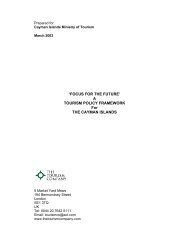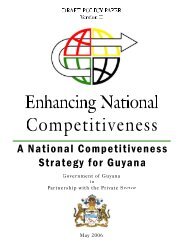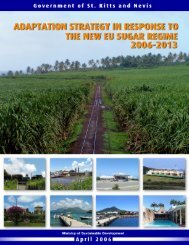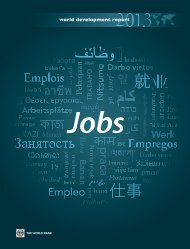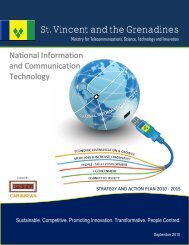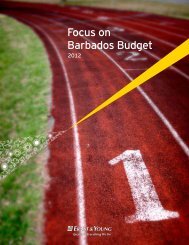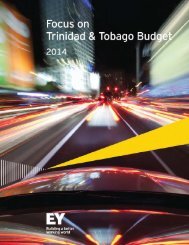Business Removing
Doing Business in 2005 -- Removing Obstacles to Growth
Doing Business in 2005 -- Removing Obstacles to Growth
- No tags were found...
Create successful ePaper yourself
Turn your PDF publications into a flip-book with our unique Google optimized e-Paper software.
46 DOING BUSINESS IN 2005<br />
What to reform?<br />
In an attempt to improve credit markets in the 1990s,<br />
many developing countries introduced procedures for<br />
reorganizing bankrupt companies, along the lines of<br />
Chapter 11 in the United States. The procedures are almost<br />
never used. A better approach is to improve credit<br />
information systems and legal rights. Doing <strong>Business</strong> in<br />
2004 recommended regulations or codes of conduct to<br />
encourage lenders to participate in private bureaus. It<br />
also discussed how public registries can complement or,<br />
in some cases, help compensate for a lack of private information<br />
sharing. And it explored ways to improve debt<br />
recovery in bankruptcy, including giving clear and predictable<br />
priority to secured creditors.<br />
Six other reforms expand access to credit:<br />
• Distributing both positive and negative information.<br />
• Expanding providers of data to the credit registry.<br />
• Making credit registries electronic.<br />
• Introducing universal security for debtors and creditors.<br />
• Establishing registries for all security interests in<br />
movables.<br />
• Permitting out of court collateral enforcement.<br />
Distribute positive and negative credit information<br />
The more information a registry provides to help predict<br />
defaults, the more useful it is to lenders, and the more<br />
credit available (figure 6.5). 11 Seventeen countries distribute<br />
only a limited range of positive data, all through<br />
public registries. Australia, Denmark, Estonia, Ghana,<br />
New Zealand and the Philippines distribute only negative<br />
data. 12 Why not permit both? The excuse is usually<br />
FIGURE 6.5<br />
Broader information and electronic access—more credit<br />
Increase in private credit to GDP associated with:<br />
Percentage points<br />
12.6<br />
Both positive<br />
and negative<br />
information are shared<br />
12.0<br />
Retailers,<br />
trade creditors<br />
and/or utilities<br />
also submit data<br />
10.8<br />
Access<br />
is electronic<br />
Note: Analysis controls for income, GDP growth, enforcement, and legal rights.<br />
Relationships are significant at the 10% level.<br />
Source: Doing <strong>Business</strong> database.<br />
privacy. But consumer protection laws can allow sharing<br />
of both while safeguarding privacy. In 2003 Greece permitted<br />
sharing positive data but with stricter requirements<br />
for consumer consent before it can be accessed,<br />
enabling the borrower to opt out of the system if desired.<br />
Brazil, Hong Kong (China) and Turkey did the same.<br />
Borrowers have the right to access their own credit reports<br />
and a clear mechanism to challenge errors.<br />
Expand providers<br />
Expanding the sources of data also works. Trade creditors,<br />
retailers and utilities have a wealth of information<br />
on payment histories. Sharing it increases the power to<br />
predict default and expands credit (figure 6.5). 13 Some<br />
85% of private bureaus use data from retailers and utilities,<br />
but only 35% of bank-owned bureaus do. And with<br />
the exception of Belgium, all public registries gather data<br />
only from supervised financial institutions. Banking<br />
laws are sometimes a restriction to sharing data from<br />
non-bank creditors, as in Poland. The Czech bureau is<br />
awaiting a revision to the Personal Data Protection Act<br />
to include information from nonbanking sources. The<br />
Turkish bureau will do so by the end of 2004.<br />
Make the registry electronic<br />
An easy way to improve credit registries, without changing<br />
laws or negotiating with lenders to submit more<br />
data: provide online access. The new online system in<br />
Pakistan cost $500,000 to set up. It delivers reports to<br />
lenders instantly. Compare that with a bank in Cameroon,<br />
which must wait up to 3 months before getting a<br />
written report in the mail. Creditors in 24 other countries<br />
cannot access data electronically. With technology<br />
so cheap, there is no reason to wait. Providing online access<br />
is associated with more credit (figure 6.5). And it<br />
may help spur commercial banks to adopt credit scoring<br />
technology, which both speeds the lending process and<br />
reduces opportunity for gender bias. 14<br />
Introduce universal security for debtors and creditors<br />
As a part of its collateral law reform in 2002, Slovakia<br />
permitted debtors to use all movable assets as collateral—present<br />
and future, tangible and intangible— abolishing<br />
the requirement for specific descriptions of assets<br />
and debt. Since then more than 70% of all new business<br />
credit is secured by movables and receivables. Credit to<br />
the private sector increased by 10%.<br />
Borrowers in all countries can pledge land or land<br />
use rights. All can pledge tangible movable assets without



